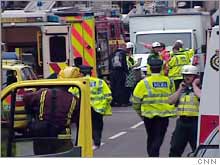 |
| Emergency workers in London after the attacks. |
|
|
|
|
|
|
|
NEW YORK (CNN/Money) -
After Thursday's terrorist bombings in London, hedge fund managers in the United States were buying Treasuries and in some cases shorting stocks of vulnerable sectors like retail, travel and transportation.
Still others were closing out short positions and buying sector-specific stocks like insurance companies. But many managers said they weren't overhauling their portfolios, predicting that any rise in Treasury bonds and losses in stocks would be short-term -- predictions borne out even earlier in the day than many had expected.
Those who took defensive stances early by shorting some sectors may end the day underwater. Since the market bottomed out fairly early in the day, anyone who started the day shorting aggressively will either take their losses today or wait to see what happens Friday.
Short sellers borrow stock and sell it, betting they can buy it back more cheaply later to repay the loan -- and pocket the difference.
Forrest Fontana, who manages the equity hedge fund Fontana Capital, opted to exercise caution.
With second-quarter earnings reports due, "the last thing you want to do is a drastic repositioning of your portfolio, and take yourself out of your core positions," he said. "What we were mostly doing is refocusing on core names and trying not to add many new positions. When there is a lot of sudden movement you don't want to overread or overreact."
Fontana said he bought stock in U.S. insurance company AIG in before-hours trading. "Sometimes it's controversial whether insurers will go down or up on terrorist events, but there were lots of positive things happening at AIG in terms of post-Spitzer news," he said. "I thought that was a name I wanted exposure to. "
Fontana said one thing he was hesitant to do was make big shorts bets early in the day on the thesis that stock market was vulnerable to a downturn.
"Shorting off emotion is one of the worst things to do -- so if you had a short position that you were making money on, you'd probably start to cover it. That's probably better than putting on new shorts. Usually in an environment like this, what I generally do is shrink my book, which means I reel in my gross exposure and get smaller in terms of position size."
Experts offered similar advice for average investors, saying that if you're worried about your investments, step back a bit before reacting. (For more on that story, click here.)
Larry Smith, chief investment officer at Third Wave Global Investors, a Greenwich, Conn., hedge fund, and former CIO at Credit Suisse Asset Management, said, "As horrible as today's events are, when you see a market move quickly because of a socio-political [and not an economic] event, it frequently spells an opportunity from an investment perspective."
"Market dislocation will create opportunities as much as problems for risk management," agreed Andrew McCaffery, CEO at Attica Alternative Investments. "But it's unlikely that today's events will take out a hedge fund," he told Reuters.
Portfolio managers agreed that attacks such as London's Thursday, as well as last year's train bombings in Madrid and the Sept. 11 attacks in the U.S., reinforced some trends that were already in place.
Barbara Marcin, portfolio manager at the Gabelli Blue Chip Value Fund, a mutual fund, noted that airline and some travel stocks fell, while industrial stocks also lost ground, but defense shares did well.
"In an industry that's having difficulty, even just a three- or six-month travel slowdown can exacerbate problems," said Marcin. "But in general, there has not been much effect on earnings or profits of specific stocks or sectors. The key issues this year -- interest rates and oil -- remain the same."
One obvious short-term effect was a flight to safety, with portfolio managers scooping up Treasuries and Swiss francs while waiting for the effects of the attacks to shake out in the markets. Third Wave's Smith said both the euro and Swiss franc rose on this kind of buying.
Gabelli's Marcin predicted the flight to safety would be very short-term. "Treasuries definitely jumped up, but I wonder if they will even hold onto the gains today," she said.
One manager of a multi-billion dollar equity hedge fund noted that today's events are a mild negative from a purely financial perspective. Any hit to retail sales and travel in Britain was unlikely to last for more than a month, the manager said.
There was relatively little short-selling in U.S. markets, and people on derivatives desks said much of the activity in futures market has been covering short positions rather than taking on new ones. But there haven't been signs that hedge fund managers were panicking, this manager said.
Third Wave's Smith said that to the extent that equity, bond or currency markets overreact to today's socio-political events, it can often create opportunities.
"As a general rule we think equities around the world are quite cheap, and that's not just constrained to the U.S.," he said. "If you take a look at Europe, Switzerland, Japan, the U.K. – all of those are cheap" given that interest rates are relatively low.
Managers said they have not heard about particular funds getting squeezed by the jump in bonds and gold or the drop in European stocks.
"Whenever you have a big move in the market, we shouldn't be surprised by some fund having difficulty," said Smith. "The horizon by which people measure hedge fund performance is very short, so often there is the quick impact of people being forced (to sell).
But there are strategies that will do well and strategies that will do poorly, he said, adding: "The markets are much deeper and broader than any impact one hedge fund could arguably have."

|